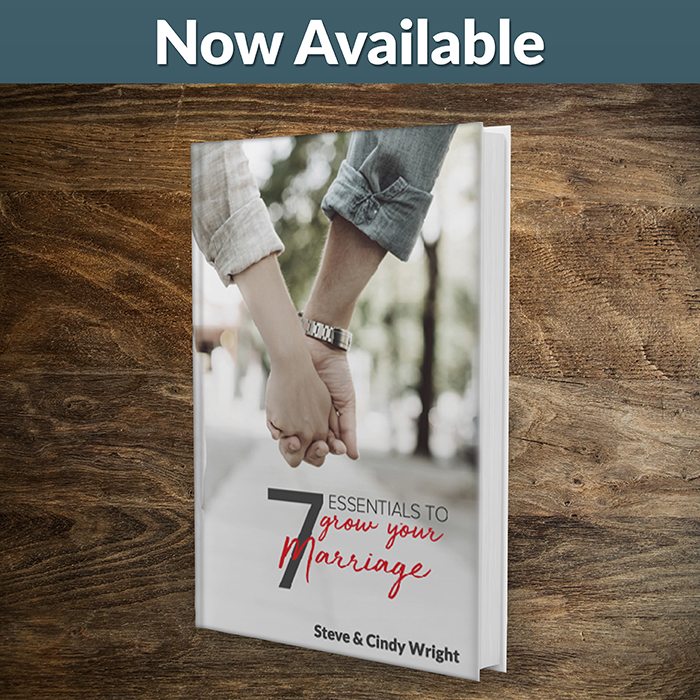 We’ve been married a LONG time (48+ years)! And along the way we’ve learned to say certain impactful phrases that make positive differences in our relationship. And this week we’re going to share a few of them with you. That’s because it’s true what Jim Daly says:
We’ve been married a LONG time (48+ years)! And along the way we’ve learned to say certain impactful phrases that make positive differences in our relationship. And this week we’re going to share a few of them with you. That’s because it’s true what Jim Daly says:
“With our words we either beat the life out of our marriage or we cultivate, feed, and water it to ensure happy years ahead.”
Of course, we’re all about doing what it takes to grow our marriages into healthy, loving ones. So we’re joining God in this mission. As we’re told in God’s word: “Wise words satisfy like a good meal; the right words bring satisfaction. The tongue can bring death or life.” (Proverbs 18:21) So here are some wise words that can bring life, rather than death to your relationship. These impactful phrases have helped our marriage A LOT. And we hope they’ll help yours too, as you use them.
We’re starting out with a pretty “easy” or evident phrase. Even so, we’ve found that just because they should be easy to say it, it doesn’t mean that we do. And it also doesn’t mean that we back them up with our actions. BOTH are important! Here’s the first of several impactful phrases we should say often in our marriages:
Speaking Impactful Phrases
— I LOVE YOU. There! We said it. And we encourage you to say it to your spouse too… often! Actually, you should say it every day to your spouse. You did this often before you married each other. These simple words, when spoken, grew your love for each other. You actually hugged your spouse with your love every time you said them. Why would this be any less important now that you are married? In reality, it’s more important than ever! Do you want a boring, lack-luster marriage where you act like roommates?
Or is that happening already? If so, you need to fix that. Roommates don’t say, “I love you.” But spouses should!
“Maintain the ‘magic’ between you and your spouse. Keep saying ‘I love you.’ These 3 little words are very powerful! Few people, if any, tire of hearing that they’re loved. And when you say ‘I love you’ do your best to give your spouse your full attention.” (Jim Burns)
Also look for ways to back those loving words up with actions. “Love is not about grand intentions. It is about words and actions.” (Robert Brault)
Here’s what Melody Hanson says about this:
“Remember what love does: Love gently wipes vomit from a loved one’s face. Love trusts God always and looks for goodness over and over in a person you don’t recognize, remembering the person you love. Love educates itself about what your loved one is going through.”
Loving Your Spouse Through Words and Deeds
To help you further with this “education” process, we have 2 great tools for you. One will help a husband show love to his wife HER way. And the other will help a wife to show love to her husband HIS way. You may think you know the best way to show love to your spouse. But do you really? To help you do this, here is one of many tools that can assist you in this mission:
• 100 WAYS TO LOVE YOUR HUSBAND HIS WAY
• 100 WAYS TO SHOW LOVE TO YOUR WIFE HER WAY
Above all, remember, the words of Jesus:
“Love one another as I have loved you. By this all men will know you are my disciples, if you love one another.” (John 13:34-35)
More Impactful Phrases?
Here’s another of the Impactful Phrases God has shown us we need to use more often:
— BE KIND. We confess that we have to use those words with each other from time to time. That’s the phrase we use with each other to tone things down. One of us will start to say something unkind or say something in an unkind manner. That’s when the other says, “Be kind.” You don’t have to shout it out. Say it kindly. (It’s the principle of “A soft answer turns away wrath.”) This has helped us to de-escalate situations where we’re conflicting with each other.
I remember a while ago when I heard a couple “talking” to each other in “less than kind” ways. I wanted so badly to go up to them and say, “Be kind. You can say the same thing to each other in a kinder way, more respectful way.” It was disturbing to hear their argument in the first place. But it was even more disturbing to hear their toxic words and tones aimed at each other.
But in reality, we confess that we have been there and have done that. It was wrong, and we knew/know it! That’s why we have made a type of pact with each other that when one of us says the words, “Be kind” we tone things down. Or it may be that we agree to take a break to resolve matters after we’re both in a better emotional place. This is difficult when you feel strong about an issue. But the other toxic approach seems to slam the other’s ears shut.
Tactics That Cause Even More Problems
This goes along with something that Drs Les and Leslie Parrott write:
“Some people feel that they must put others ‘in their place’ during a disagreement. They might use unhealthy tactics to keep control of their spouse, wrongfully believing that this will get their spouse to listen and respond the way they want. The thing is, these tactics actually cause your spouse to withdraw from you and put their guard up. You’ve made the issue worse because of your disrespectful behavior toward them. Now, they’re not only upset at the original issue, they’re trying to defend themselves from your angry behavior, as well. Once you’ve put your spouse on the defensive, you can bet your side of the story won’t be heard—and you’re definitely not earning points (or respect) in the relationship, either.” (From the article, 3 Truths About Anger Everyone Should Know)
So, be kind; be nice.
“Oddly enough, many people believe that because they are married, they don’t have to be nice. It’s as if they think that their marriage license is a license to be mean and nasty. Oh, they would never say that. But that is certainly how they act. …They bark, yell, and throw insults at each other. It’s as if they believe a marriage license grants them permission to be however mean they deem necessary. They can be as short and impatient as the moment calls for. They think that somehow a marriage license allows them not to live out their Christian faith. ‘I don’t have to be nice—I’m married!’” (Mark Gungor)
Yes you do! God doesn’t expect us to empty our kindness out once we say our marriage vows. We still need to be kind.
Additional Impactful Phrases?
And then here are a few more impactful phrases that too many spouses forget to use with each other:
— “PLEASE” and “THANK YOU.” Again, a marriage license does not give you the right to be rude and take your spouse for granted. This is a wake-up call for those that need it. Don’t let strangers treat your spouse with more courtesy and appreciation than you do.
Are you so comfortable with your spouse that you sometimes forget to be at least as kind to him or her as you are to others? A problem that often happens in marriage is that we become almost too familiar with each other. We give ourselves permission NOT to extend common courtesies and instead slip into negative behavior. This can erode the relationship. If you’re there …rewind and be kind.
“Follow rules of courtesy with your spouse. Acts of courtesy and thoughtfulness that you give others should also be given to your spouse. These include saying ‘please’ and ‘thank you,’ offering to get something your spouse needs or would like, pouring your spouse a cup of coffee rather than waiting for him or her to get it. Small acts send an important message: ‘I care about you.’ Little things really do mean a lot.” (Jeannette and Robert Lauer)
Make sure you:
“Thank your spouse for something specific you appreciate that he/she did. ‘Thanks for being a great provider’ or ‘Thanks for washing the dishes.’” Don’t fall into the trap of taking your spouse for granted. Be generous—be an encourager, even in little things.” (Gary Smalley)
A Warning Phrase
Here’s another impactful phrase that we need to speak to ourselves more often:
— DON’T GO THERE. Both of you can use this impactful phrase at different times in your marriage. I (Cindy) often use it on myself as a warning not to allow my mind to go down thought trails that shouldn’t be visited or revisited. Other times God warns me with that phrase. He will tell me, “Don’t let your mind go there. It will not take you to a good place. If you do you will be sorry.”
Other times I wish that would have popped into my mind as a warning. That’s because I have said or have done something that I should have stopped before I started. Have you been there?
Other times we have used this phrase on each other. I’ll warn Steve or he will warn me not to go there—it will just lead to arguments. I’ll say to Steve, “Don’t go there. I’m not in a good mood and I won’t be receptive to what you have to say right now. Please give me some time here to get to a better mindset.” Or maybe I need to pray about it first before he presents it to me again.
Or Steve will say to me, “I’m tired. Don’t go there. Bring it up at a better time.” It may be late at night and it isn’t a good time to “discuss” a conflicting issue. Or maybe he’s just “out of sorts.” We’ve all been there sometimes, haven’t we? We’re in a snarly mood, and we’re not exactly sure why. But if we “go there” …we, AND our spouse will be sorry for it!
2 more impactful phrases we need to use more often:
— “I’M SORRY” … “WILL YOU FORGIVE ME?” Now, these are two different impactful phrases that need to be tied together. They go hand in hand. Honestly, we can’t imagine that you can be married more than a week without at least one of you needing to apologize to the other.
“No matter how blissfully a marriage begins, all husbands and wives eventually fail each other. We are sinners saved by grace and we need grace not only from God but also from one another.” (Dan Allendar)
We need grace. But we also need to give our offended spouse what they need:
“When we offend our spouse by our words, actions, or attitude, it’s common to want to take the easy way out by offering a simple, ‘Sorry’ or ‘I apologize.’ However, just saying these words without proper context is as hurtful as our first offense. It’s more effective and meaningful if we extend the ‘apology’ by admitting our wrong, acknowledging our spouse’s hurt, intending not to do it again and asking for forgiveness.” (Kevin B Bullard)
As Kevin says, “Half baked apologies are offensive.” And they are!
“Quickly saying the words ‘I’m sorry’ is a bad apology because it often comes off as insincere, and could trigger another battle. Next time you seek mercy, add the ‘B’ word. Say, ‘I’m sorry because…’ and share how you hurt your mate and what you’ll do to prevent the wrongdoing from recurring. Research shows that when you add the ‘because clause’ your words are more persuasive.” (Laurie Puhn)
Whatever you do:
“Humble yourself enough to give or receive a genuine apology. At a certain point in every marriage, one or both of you is bound to mess up. Someone will do something to disappoint the other. The hallmark of a good marriage is how well you move past these incidents. Can you sincerely say ‘I’m sorry’ without being prompted? And can you accept when your spouse says ‘I’m sorry’ without questioning their sincerity?” (Tara Pringle Jefferson)
We can go on and on in giving you more impactful phrases. The thing is… use the communication tools that will best help you to make a positive difference in your marriage relationship.
We will conclude by giving you these thoughts. Words matter! When we talk to each other, and about each other, here are some good guidelines:
“There are some filters our words should have to pass through before they come out of our mouths. If they don’t make it through all of these 5 filters, then they probably should never be spoken:
1. Do I have good motives? Is my reason for saying it beneficial to my spouse or only for selfish purposes?
2. Does it build my spouse up? Words are not neutral. They either tear down or build up. They are either hurtful or helpful.
3. Is it confidential?
4. If my spouse were present, would they be pleased with my words? You’ve heard this one before, but it’s always worth remembering. We should always honor our spouse whether they are with us or not.
5. Is it true? Truth trumps all. If it’s not true, don’t say it.” (Mark Merrill)
“And above all these put on love, which binds everything together in perfect harmony.” (Colossians 3:14)
Cindy and Steve Wright
— ADDITIONALLY —
To help you further, we give a lot of personal stories, humor, and more practical tips in our book, 7 ESSENTIALS to Grow Your Marriage. We hope you will pick up a copy for yourself. (It’s available both electronically and in print form.) Plus, it can make a great gift for someone else. It gives you the opportunity to help them grow their marriage. And who doesn’t need that? Just click on the linked title or the picture below:
ALSO:
If you are not a subscriber to the Marriage Insights (emailed out weekly)
and you would like to receive them directly, click onto the following:
More from Marriage Missions
Filed under: Marriage Insights








Not hearing the words “I love you” from my wife for over six years now in any way, shape or form (verbally, texting, emailing, etc.) has been so incredibly painful, especially when she says it to every other person in her life she cares about.
I recently heard the following comment and it struck home so very much: “People don’t fall out of love. They fall out of repentance and forgiveness.” This is so very, very true.